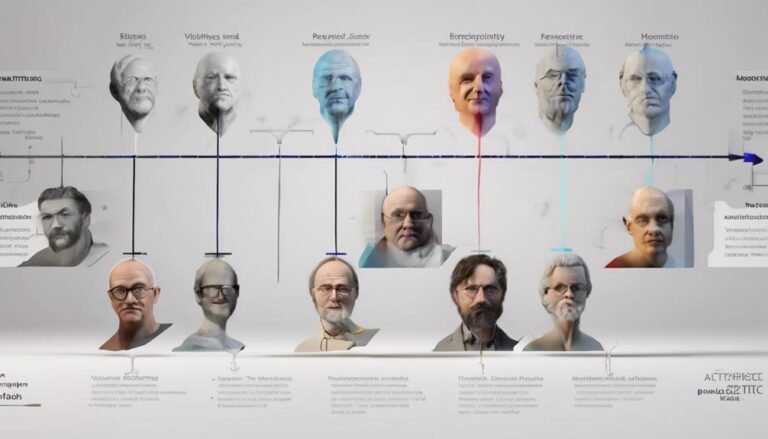Introduction to Social Cognitive Theories
You may find it interesting that social cognitive theories have been widely utilized in fields such as education, psychology, and communication studies, with a significant impact on understanding human behavior. Explore the intricate world of social cognitive theories to uncover how individuals perceive and respond to their social environment through cognitive processes. Discover the key concepts, such as observational learning and self-efficacy, that shape our interactions and behaviors in society. Delve into the practical applications and implications of these theories in shaping behavior and fostering personal development.
Key Takeaways
- Social cognitive theories explore the interaction of individuals, environment, and behaviors.
- Cognitive processes influence learning through observation and social interactions.
- Observational learning involves modeling behavior and acquiring new skills from others.
- Bandura's research on observational learning and self-efficacy is influential in psychology.
- Self-efficacy in social contexts shapes behavior, performance, and response to feedback.
Understanding Social Cognitive Theories
To understand social cognitive theories, you must explore the intricate interplay between individuals, their environment, and their behaviors. Cognitive processes play a vital role in shaping how individuals perceive, interpret, and respond to social interactions. These processes encompass mental activities such as attention, memory, problem-solving, and decision-making, all of which influence how individuals learn from their interactions with others.
Social interactions serve as the primary context in which cognitive processes operate and develop. Through observing and engaging with others, individuals acquire knowledge, skills, and attitudes that shape their behaviors. Bandura's social cognitive theory emphasizes the importance of observational learning, where individuals learn by watching others and modeling their behaviors. This learning process is heavily influenced by cognitive factors such as attention, retention, motor reproduction, and motivation.
In essence, cognitive processes and social interactions are intricately intertwined in social cognitive theories. By understanding how these elements interact, researchers can gain insights into how individuals learn, develop, and adapt their behaviors within social contexts.
Key Concepts in Social Learning
Understanding social cognitive theories involves grasping key concepts in social learning, which form the foundation for comprehending how individuals acquire behaviors through observation and interaction.
Cognitive development plays a pivotal role in social learning, as individuals actively process information from their surroundings, interpret it, and integrate it into their existing knowledge and beliefs. This process of cognitive development shapes how individuals understand and imitate behaviors observed in social interactions.
Social interactions are essential in social learning, providing individuals with opportunities to observe others, learn from their experiences, and model their behaviors accordingly. Through interactions with peers, family members, and the broader social environment, individuals acquire new skills, attitudes, and values.
These social interactions not only influence cognitive development but also play a significant role in shaping individual behavior patterns.
Role of Observational Learning
Observational learning plays a fundamental role in social cognitive theories by emphasizing how individuals acquire behaviors through direct observation and modeling of others. Modeling behavior, also known as social imitation, is a key component of observational learning.
By observing others, individuals can learn new behaviors, attitudes, and emotional reactions. This process isn't limited to just imitating positive behaviors; negative behaviors can also be acquired through observational learning.
One essential aspect of observational learning is vicarious reinforcement. This concept involves individuals observing the consequences of another person's actions and adjusting their behavior based on those outcomes. Through vicarious reinforcement, individuals can learn what behaviors are likely to be rewarded or punished in a given social context, influencing their own behavior accordingly.
Understanding observational learning and vicarious reinforcement is vital in comprehending how individuals acquire and exhibit behaviors in social settings. By observing others and learning from their experiences, individuals can expand their behavioral repertoire and adapt to various social situations effectively.
Bandura's Influence on Psychology
Bandura greatly influenced the field of psychology through his pioneering work on social cognitive theories. His research explored the domain of cognitive psychology, focusing on how individuals acquire knowledge, process information, and develop behaviors through observation and modeling.
Bandura's famous Bobo doll experiment, where children observed aggressive behavior towards a doll and then imitated it, showcased the power of observational learning in shaping behavior. This experiment highlighted the importance of social factors in cognitive development and behavior modification.
Bandura's contributions to psychology extended beyond observational learning. His work on self-efficacy, the belief in one's ability to achieve goals, further solidified his impact on the field. By emphasizing the role of self-perception in motivation and behavior, Bandura's research provided valuable insights into how individuals approach challenges and work towards success.
Self-Efficacy in Social Contexts
You'll explore how self-efficacy plays an essential role in shaping behavior within social contexts.
Understanding its impact on performance can provide valuable insights into how individuals navigate social interactions.
Additionally, recognizing the effects of social influence on self-efficacy can shed light on the complexities of human behavior in group settings.
Role in Behavior
The concept of self-efficacy within social cognitive theories plays a significant role in shaping individuals' behaviors in various social contexts. Behavior analysis indicates that individuals with high self-efficacy are more likely to engage in tasks, persevere through challenges, and achieve desired outcomes.
Cognitive processes, such as beliefs in one's capabilities, influence how individuals approach social interactions and navigate complex social environments. When individuals believe in their ability to succeed in social situations, they're more likely to exhibit proactive behaviors, seek out social opportunities, and effectively communicate with others.
Moreover, self-efficacy impacts how individuals interpret and respond to feedback from their social interactions. Those with higher self-efficacy tend to perceive feedback as constructive and use it to improve their social skills, while individuals with lower self-efficacy may view feedback negatively, leading to avoidance or disengagement from social interactions.
Understanding the role of self-efficacy in behavior within social contexts can provide insights into how individuals navigate social relationships, handle social challenges, and achieve positive outcomes in various social settings.
Impact on Performance
Self-efficacy in social contexts greatly influences individuals' performance and behaviors by shaping their beliefs in their capabilities to succeed in social interactions. Performance enhancement in social settings is often linked to self-efficacy, which serves as a key motivational factor driving individuals to engage in various social activities.
When individuals have high self-efficacy in social situations, they're more likely to approach social interactions with confidence, persistence, and resilience, leading to improved performance outcomes.
Cognitive processes play a significant role in the development of self-efficacy within social contexts. Through experiences and observations, individuals acquire social skills and competencies that contribute to their self-efficacy beliefs. Positive feedback and successful social interactions further reinforce these beliefs, leading to a cycle of increased self-efficacy and improved performance.
Social Influence Effects
Frequently observed in social contexts, the effects of social influence on individuals' beliefs in their capabilities to succeed play a pivotal role in shaping their performance outcomes. In social cognitive theories, self-efficacy in social contexts is influenced by various factors such as conformity pressure and group dynamics.
Conformity pressure refers to the tendency of individuals to adjust their beliefs or behaviors to align with those of a group, even if it contradicts their own judgment. In such situations, self-efficacy can be either enhanced or diminished based on the individual's perception of their ability to meet the group's expectations.
Moreover, peer influence and social norms also play a significant role in impacting self-efficacy in social contexts. Peer influence can either bolster or undermine an individual's self-efficacy depending on the nature of the interactions and the perceived competence of the peers.
Additionally, adherence to social norms can shape individuals' beliefs about their capabilities to succeed within a specific social group. Understanding these dynamics is important for comprehending how social influences can shape self-efficacy and, consequently, performance outcomes in social contexts.
Applications in Real-world Settings
Utilizing social cognitive theories in practical settings allows for a deeper understanding of how individuals perceive and interact with their environment. In the domain of workplace behavior and training methods, these theories can be applied to enhance employee performance and satisfaction.
By analyzing how individuals learn from observing others and how self-efficacy influences their motivation, organizations can tailor training programs to be more effective. For instance, incorporating modeling techniques in training sessions can help employees learn new skills by observing others successfully perform them.
In educational interventions, social cognitive theories play an important role in understanding group dynamics within classrooms. Teachers can use these theories to promote collaborative learning environments where students can observe and learn from one another.
By fostering a sense of collective efficacy within groups, educators can enhance students' motivation and academic performance. Additionally, understanding how social norms and peer influences shape behavior can aid in implementing effective interventions to address issues like bullying or academic disengagement.
Implications for Behavior Modification
In the context of social cognitive theories, understanding how individuals perceive and interact with their environment can inform effective behavior modification strategies. Behavior change is a central focus, and the application of reinforcement strategies plays an essential role in shaping and sustaining desired behaviors.
By utilizing cognitive restructuring techniques, individuals can modify their thought patterns to support behavioral changes. This process involves identifying and challenging negative or unhelpful beliefs that may hinder progress towards behavior goals.
Modeling techniques, another key component of social cognitive theories, involve observing and imitating the behaviors of others. This can be particularly useful in behavior modification efforts, as individuals can learn new behaviors through observation and subsequent replication. By witnessing successful behavior change in others, individuals may be more inclined to adopt similar behaviors themselves.
Conclusion
You've explored the intricate web of social cognitive theories, uncovering the pivotal role of cognitive processes in shaping social learning.
Just as a spider carefully weaves its intricate web, individuals navigate social interactions through attention, memory, and decision-making.
Remember, like a spider spinning its web, these cognitive factors intricately shape how we perceive and respond to the world around us.
Keep observing, learning, and adapting in the complex web of social interactions.







